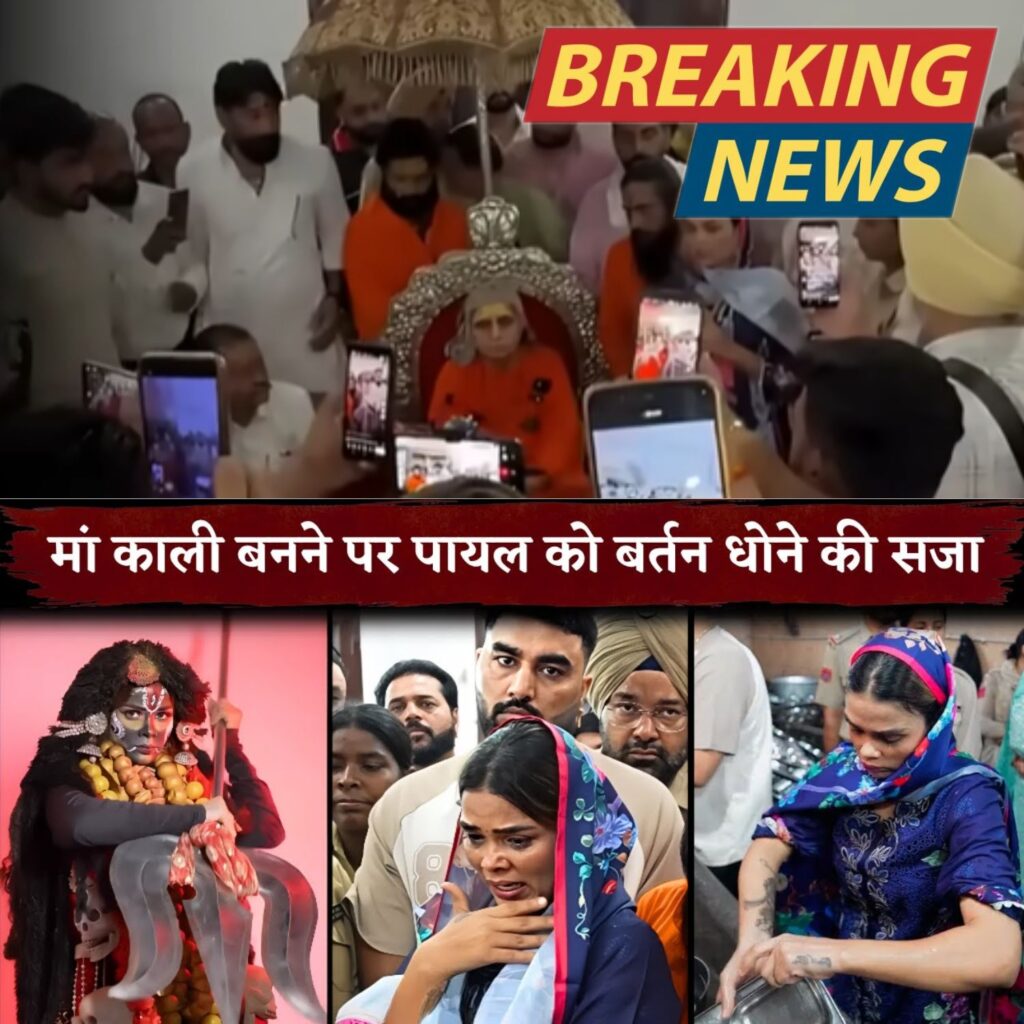🔥Controversy Erupts: Payal Malik Punished with Temple Chores After Kali Maa Avatar Sparks Outrage
Payal Malik, a familiar face on social media and wife of YouTuber Armaan Malik, has always been in the public eye—sometimes for her unconventional family, other times for her candid moments. But nothing could have prepared her for the storm that followed a gesture meant only for her daughter.
.
.
.

It all started innocently enough. Payal’s young daughter, Tooba, is a devoted follower of Goddess Kali. The little girl spends her days chanting Kali Maa’s name and looking up to the powerful goddess as her hero. Wanting to bring a smile to her daughter’s face, Payal decided to dress up as Kali Maa, recreating the goddess’s iconic look for a heartfelt video.
But what was meant as a loving tribute soon spiraled into a major controversy. As the video spread online, critics accused Payal of hurting religious sentiments. The backlash was swift and fierce—what some saw as a mother’s devotion, others saw as disrespect.
Suddenly, Payal found herself at the center of a heated debate. With folded hands and a heavy heart, she addressed the public:
“I want to sincerely apologize for my video. I did it only for my daughter, who truly worships Kali Maa. I never intended to offend anyone, but I realize now that I made a mistake.”
But the apology wasn’t enough for some. National Secretary Deepanshu Sood publicly condemned her actions, insisting that Payal’s portrayal had wounded religious feelings. The pressure mounted, and Payal knew she had to make amends in a way that showed her respect for the faith she’d unintentionally hurt.
She traveled to the revered Kali Mata Temple in Patiala. There, before the goddess and the gathered devotees, Payal bowed her head and asked for forgiveness. But words alone wouldn’t suffice—she was asked to serve a penance. For an hour, Payal washed the used dishes from the temple’s community kitchen and helped serve food to the devotees, her every action a silent apology.
Videos of her humble service quickly went viral, igniting another wave of discussion online. Some people rallied to her defense, saying, “A mother’s love for her child can never be wrong. We stand with you, Payal.” Others dismissed the controversy entirely, insisting that dressing as Kali Maa was not an insult but an act of devotion.
Yet, there were those who felt that Payal’s actions crossed a line, no matter her intentions. The debate raged on, with thousands weighing in from both sides.
Through it all, Payal remained composed and respectful, accepting her punishment without protest. Her willingness to apologize and serve at the temple became a powerful symbol—not just of humility, but of the importance of understanding and respecting deep-rooted beliefs.
Payal Malik’s story is a reminder of the delicate balance between personal expression and public sentiment, especially in a country as diverse as India. It’s a tale of a mother’s love, a society’s sensitivities, and the courage it takes to own up to one’s mistakes.
Was Payal truly at fault, or was her gesture misunderstood? The answer, perhaps, lies somewhere in the space between faith and intention.
News
गरीब पति को छोड़ गई थी पत्नी, 5 साल बाद जब पति ‘CEO’ बनकर लौटा… इंसानियत रो पड़ी
गरीब पति को छोड़ गई थी पत्नी, 5 साल बाद जब पति ‘CEO’ बनकर लौटा… इंसानियत रो पड़ी गरीब पति,…
इंस्पेक्टर पत्नी ने रिश्ता तोड़ा… सालों बाद पति SP बनकर लौटा, फिर जो हुआ..
इंस्पेक्टर पत्नी ने रिश्ता तोड़ा… सालों बाद पति SP बनकर लौटा, फिर जो हुआ.. अध्याय 1: सपनों की नींव रमेश…
पति को ‘गार्ड’ समझकर किया अपमान, वो शहर का सबसे बड़ा अफसर निकला! 😱
पति को ‘गार्ड’ समझकर किया अपमान, वो शहर का सबसे बड़ा अफसर निकला! 😱 **रोहन और काजल: एक अंडरकवर हीरो…
धर्मेंद्र की आखिरी वसीयत का राज || सालों पहले लिखी वसीयत ने मचाया कोहराम || Dharmender Property bank
धर्मेंद्र की आखिरी वसीयत का राज || सालों पहले लिखी वसीयत ने मचाया कोहराम || Dharmender Property bank धर्मेंद्र देओल…
धर्मेंद्र की छुपी हुई डायरी ने खोला सारा राज || Sunny Deol aur Hema Malini Ne salon bad Kiya faisla
धर्मेंद्र की छुपी हुई डायरी ने खोला सारा राज || Sunny Deol aur Hema Malini Ne salon bad Kiya faisla…
धर्मेंद्र की एक गलती बनी आखिरी ख्वाहिश || ऐसे होगा पहली और दूसरी पत्नी का मिलन
धर्मेंद्र की एक गलती बनी आखिरी ख्वाहिश || ऐसे होगा पहली और दूसरी पत्नी का मिलन धर्मेंद्र देओल की आखिरी…
End of content
No more pages to load






